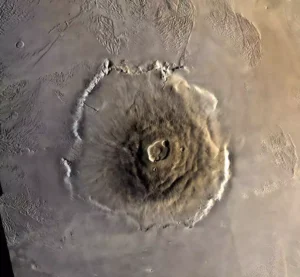ButSpeak.com
News which Matters.

In a surprising twist, frost has been discovered on the highest volcanic mountains of Mars, challenging existing beliefs about the Red Planet’s equatorial climate. This remarkable find, made possible by satellite data and high-resolution images, sheds new light on Mars’ geological history and potential for sustaining water.
On Earth, frosted mountain peaks are a familiar sight, but Mars was considered too warm and dry near its equator for such phenomena. However, recent observations from the European Space Agency’s Trace Gas Orbiter and Mars Express spacecraft, under the leadership of Adomas Valantinas from the University of Bern, Switzerland, revealed frost formation within the calderas of the towering Tharsis volcanoes.

The frost, measuring a mere 1/100th of a millimeter in thickness, appears during the coldest Martian months and evaporates rapidly with the morning sun. Despite its thinness, the accumulated frost weighs an estimated 150,000 tonnes, highlighting its significant presence atop these Martian giants.
Nicolas Thomas, co-leader of the study, explained, “Winds carrying moist air ascend the slopes of the volcanoes, where it condenses and settles as frost in the colder, shadowed regions of the calderas. This phenomenon mirrors similar processes observed on Earth and elsewhere on Mars, contributing to the Martian Arsia Mons Elongated Cloud.”
The discovery not only challenges current understandings of Mars’ climatic conditions but also holds implications for locating water reservoirs and understanding ancient Martian climates. Valantinas remarked, “This frost may hint at ancient climate cycles on Mars, possibly involving precipitation and snowfall on these volcanic peaks. It suggests unique processes enabling frost formation amidst Mars’ equatorial conditions.”
As scientists continue to unravel these mysteries using advanced computer models and ongoing observations, the implications for Mars’ geological past and future exploration efforts remain profound.